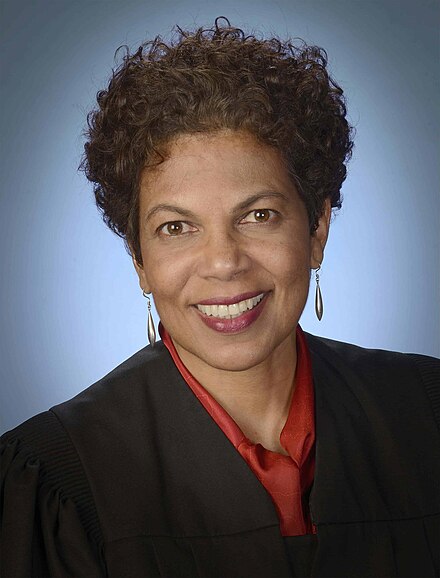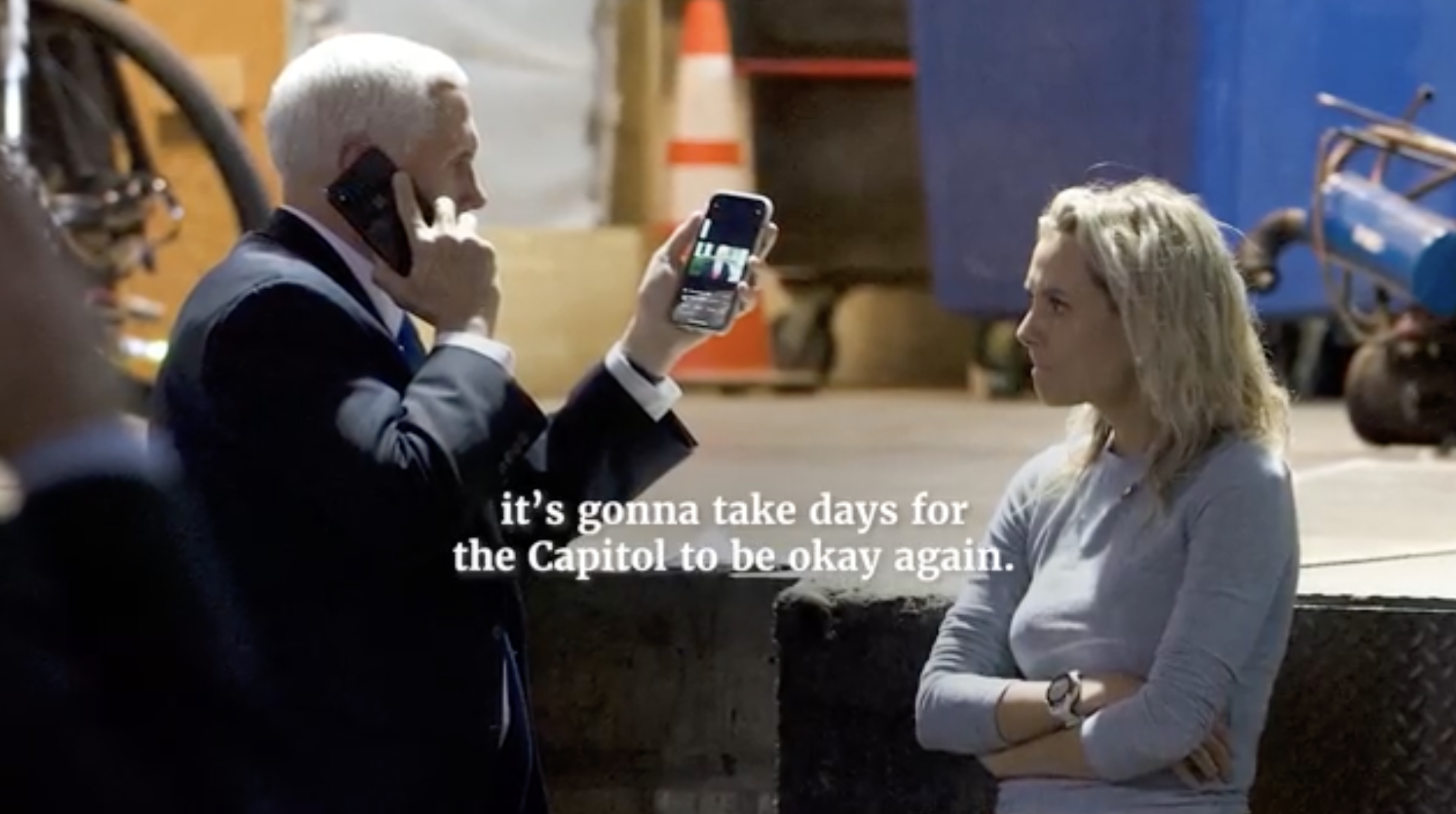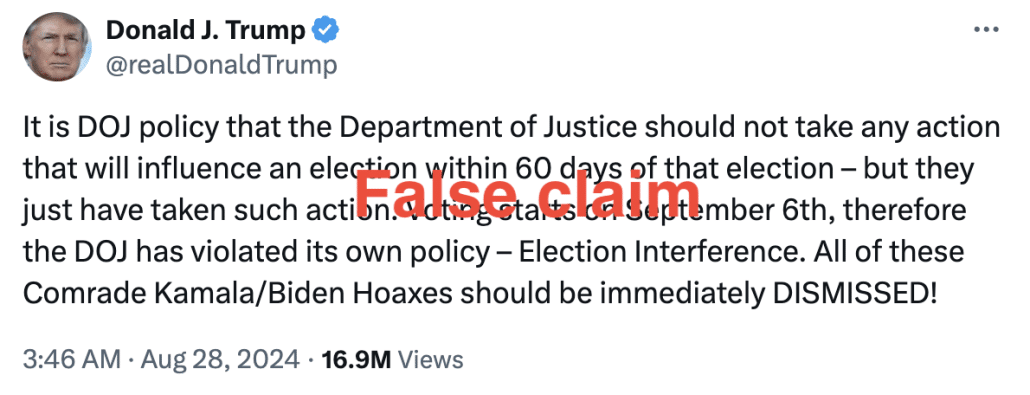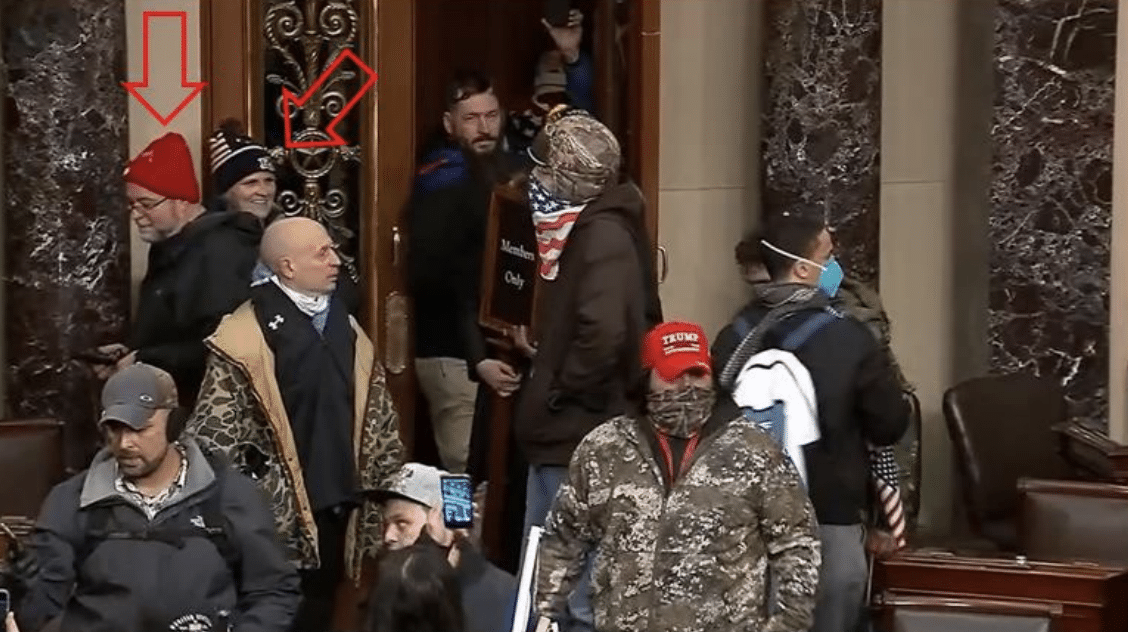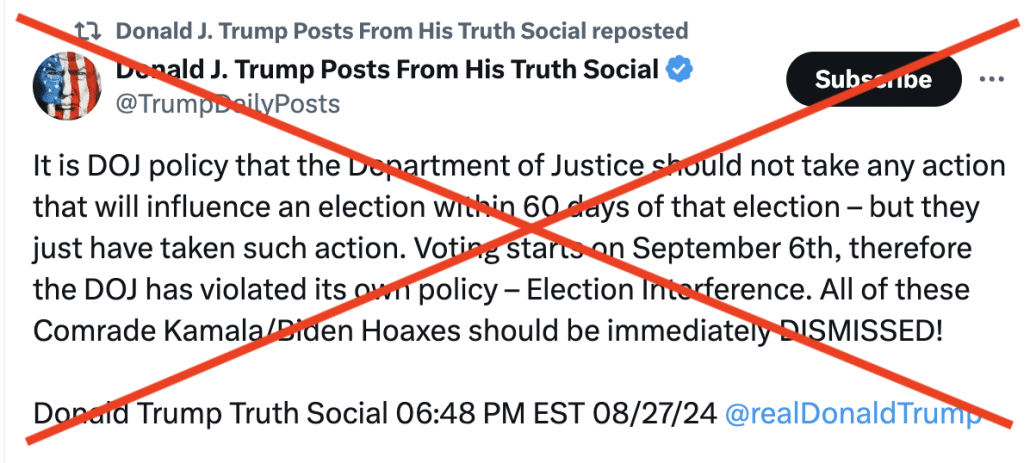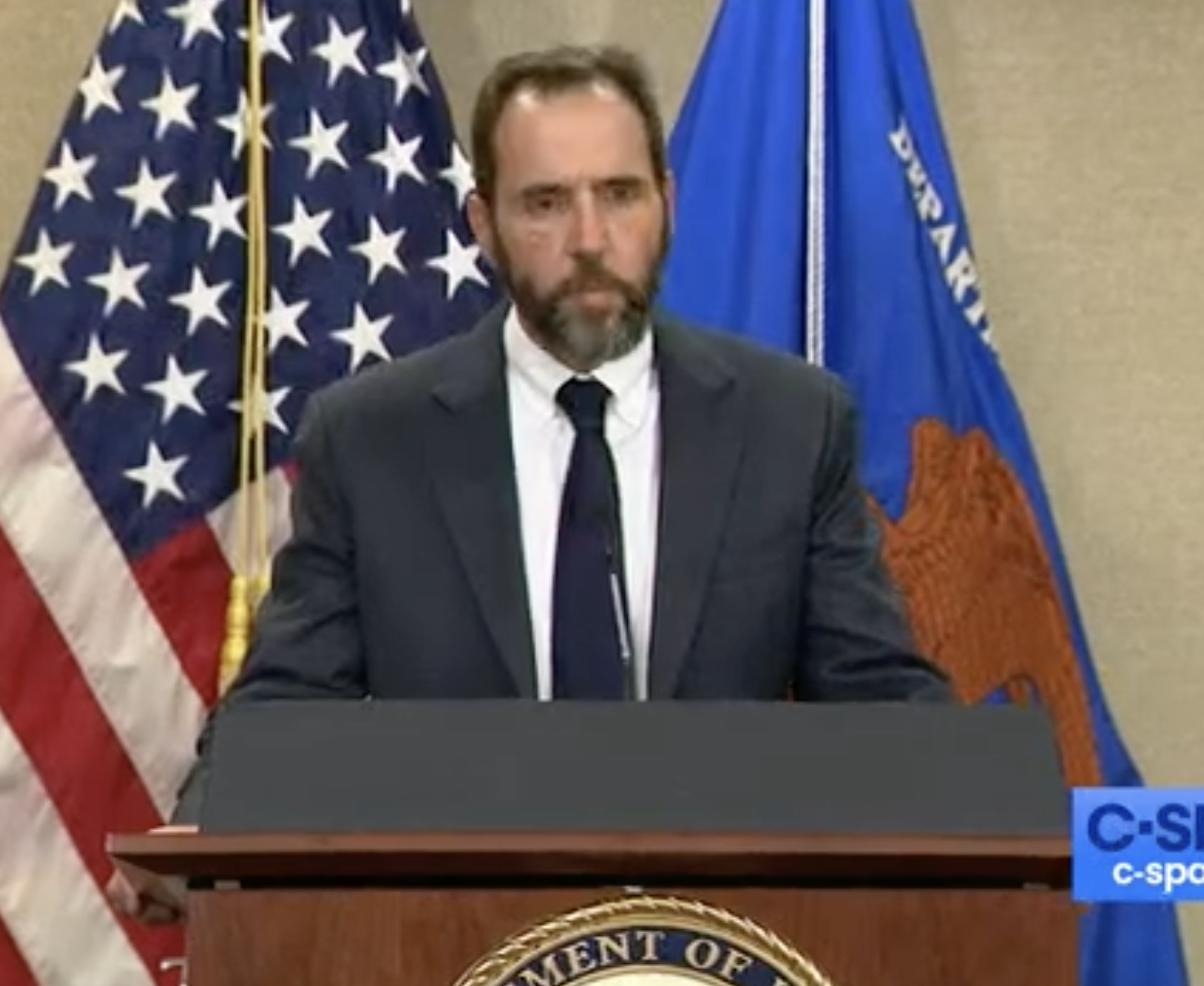On Friday, first Bloomberg (Yahoo version), then NYT reported that Jack Smith “has decided against seeking a major hearing” to address which of the allegations charged against Donald Trump were official versus unofficial acts. Here’s Bloomberg:
Special Counsel Jack Smith has decided against seeking a major hearing to present evidence in the election-interference case against Donald Trump before voters go to the polls Nov. 5, according to people familiar with the matter.
The move means that it’s unlikely a so-called mini-trial, which would include evidence and testimony from possible blockbuster witnesses like former Vice President Mike Pence, would take place before the presidential election.
Such a hearing would have been the best chance for voters to review evidence about Trump’s efforts to overturn the 2020 election result as he campaigns to regain the White House.
The decision is a win for Trump and his lawyers, who have fought efforts to reveal the substance of allegations against the former president. If Trump wins the election, the case would collapse as the Justice Department has a policy against prosecuting sitting presidents. Trump could also order the department to throw it out.
Instead, Smith and his team are carefully revising the case against Trump, according to the people familiar, who asked not to be named discussing a confidential matter. [my emphasis]
The emphasis here was on a supposed “win” for Trump’s lawyers, though they haven’t actually done anything to get that win. They haven’t filed a brief, they haven’t made any formal requests. This is a “win” that they did nothing — at least, nothing since SCOTUS rewrote the Constitution for Trump — to earn. Though the piece is right: If Trump wins the election, it seems impossible that this prosecution will lead anywhere, and Smith’s reported decision not to ask to explain the charges in more detail makes it less likely that such a mini-trial could have a bearing on whether Trump does win or not. (While Bloomberg states that “Trump’s lawyers didn’t immediately respond to a request for comment,” that description doesn’t rule out that this story was sourced to someone close to Trump, and the story does cite Trump’s spox, who seems to have just ranted about witch hunts.)
The NYT provides a better sense of whence the hopes for a mini-trial before the election came — from outside commentators (probably including me), not from anything Smith had officially said — which is important to making sense of this development.
Still, the ruling left open the possibility that Mr. Smith’s prosecutors could use a public hearing to air some of the evidence they had collected against the former president before Election Day. Several legal experts and commentators seized on the idea, saying that a hearing like that would almost resemble the trial itself — albeit without the finality of a jury verdict.
And yet such a proceeding was always going to be fraught with complications — not least if it ended up being held in the homestretch of an election in which Mr. Trump is seeking to return to the White House.
Neither of these stories mentions the last official thing we did hear from Jack Smith: that his team needed an extra three weeks, from August 9 to August 30, to consult with other DOJ components, as required by Special Counsel regulations.
The Government continues to assess the new precedent set forth last month in the Supreme Court’s decision in Trump v. United States, 144 S. Ct. 2312 (2024), including through consultation with other Department of Justice components. . See 28 C.F.R. § 600.7(a) (“A Special Counsel shall comply with the rules, regulations, procedures, practices and policies of the Department of Justice,” including “consult[ing] with appropriate offices within the Department for guidance with respect to established practices, policies and procedures of the Department . . . .”). Although those consultations are well underway, the Government has not finalized its position on the most appropriate schedule for the parties to brief issues related to the decision.
So two weeks before these stories, Jack Smith said, we need more time to talk to other people at DOJ to decide our “position on the most appropriate schedule … to brief issues,” though, as I noted here, Special Counsel regulations would not technically require consultation about the timing of hearings or briefs regarding the case in its current posture, especially given Jack Smith’s past representations that DOJ guidelines on elections would not have prohibited holding an actual trial in the pre-election period. And then, in the two weeks since, “people familiar with the matter” have decided, heard, or learned that the most appropriate schedule does not include a mini-trial, which is not something that Smith had ever publicly considered in the first place.
And neither of these stories fully address that, in most circumstances, this would not be Smith’s decision to make. Bloomberg says, “Chutkan could overrule Smith and order a major hearing prior to the election.” NYT describes that, “Judge Chutkan could in theory still order such a hearing to be held.” NYT does walk through the range of alternatives to do what SCOTUS ordered, that is, to sort through which parts of the indictment are official acts and which are not. But, in most circumstances, it was never Smith’s position to demand a public hearing, and nothing he ever said indicated he intended to do so. The goal of a mini-trial, as NYT reported, came from outside commentators.
There is one circumstance, however, where Judge Tanya Chutkan would not have a chance to weigh in. And it is one circumstance that is alluded to by both of these pieces, without addressing its potential implications. NYT states that prosecutors might seek what it assumes would be a pared-down indictment.
The prosecutors could also seek to bring a new, pared-down indictment against Mr. Trump focusing on charges they believed arose from acts undertaken in his private role as a candidate for office, not in his official role as president.
Bloomberg cites (and includes in its subhead) that prosecutors “are carefully revising the case.”
You can’t change a word in that indictment — you can’t take out all references to Jeffrey Clark’s role in subverting the election, the one thing SCOTUS said has to happen — without going back to a grand jury and superseding the original indictment. But even just doing that would put Jack Smith in the driver’s seat, effectively giving him the first shot at drafting what should and shouldn’t be included among unofficial acts that constitute crimes.
If Jack Smith is really doing what Bloomberg says — revising the case — then they have decided that they will supersede the indictment.
Now, as I suggested, even if you were doing nothing more than removing the Jeffrey Clark references, doing so would be smart in any case. Not only could Smith excise all the Jeffrey Clark materials, thereby giving Trump less surface area to attack the indictment, but he could tweak what is already there to address some of the other concerns raised by SCOTUS, for example, to clarify how candidate Trump’s reliance on fake elector certificates do not threaten Executive authorities. But minor tweaks, even the excision of the Jeffrey Clark stuff, would not require consultation with DOJ, and if Jack Smith were just excising the Jeffrey Clark stuff, he could have done that before DOJ’s election prohibition on indictments kicks in on roughly September 1.
So let’s talk about what would require consultation with DOJ, consultation requiring two full months from the immunity ruling, because it raises ways that Smith might supersede the indictment that would be a lot more interesting than simply excising the Clark stuff:
- Consultation with the Solicitor General’s office regarding edge cases on official acts
- Consultation with DC USAO on how to apply obstruction more generally
- Approval from Merrick Garland for new types of charges against Trump on January 6 actions
- Approval from Merrick Garland for charges pertaining to January 6 aftermath
Consultation with the Solicitor General’s office regarding edge cases on official acts: First, and least controversially, DOJ would consult with the Solicitor General’s office regarding any more difficult issues regarding official acts. Perhaps the most obvious of these — and one squarely raised in SCOTUS’ ruling — is the status of Mike Pence in conversations about certifying the electoral certificates. If Pence was acting exclusively in his role as President of the Senate, then Trump’s relationship to him would be as a candidate, and so under Blassingame, an unofficial act. But the Republicans on SCOTUS want to argue that some of these conversations were official acts, making Pence’s testimony inadmissible under their order. If DOJ is superseding an indictment to excise the things that need to be excised, DOJ would want the Solicitor General involved in such decisions not just because they’ll have to defend whatever stance Jack Smith adopts, but also so as to protect the equities of the Executive Branch, which DOJ traditionally guards jealously.
Consultation with DC USAO on how to apply obstruction more generally: More interestingly (and as I focused on here), if Jack Smith were to supersede the indictment against Trump, he would undoubtedly tweak the language on the two obstruction charges to squarely comply with the Fischer decision limiting it to evidentiary issues.
Since Smith got his extension, DOJ has started weighing in on a handful of crime scene cases where (unlike around 60 others) it thinks it can sustain obstruction charges under a theory that the defendant knew the import of the electoral certifications themselves and took steps to obstruct the actual counting of them.
Here’s what such an argument looks like in the case of Matt Loganbill:
At the time Fischer was decided, approximately 259 cases of the over 1,400 cases charged in the January 6 prosecution involved the application of §1512(c)(2). Some of the 259 cases were convictions at trial, while others were convictions through pleas. Some of those are currently pending trial, whereas other defendants have served their sentences of incarceration fully. As a result of Fischer, the government has endeavored to review cases – particularly those cases pending appeal, pending trial, or actively serving a sentence – in a timely and responsive fashion. Of those original 259 cases, the government has, as of the date of this filing, sought to forgo application of §1512(c)(2) – either post-conviction, pending appeal, or pending trial, in over 60 cases.5 The government continues to evaluate and/or litigate §1512(c)(2) in a variety of contexts. In this case, after a careful analysis of the Fischer opinion, the government contends that the defendant violated the statute and intends to proceed with the charge.
[snip]
- On December 20, 2020, the defendant wrote to Facebook, “This would take place Jan 6 Witnesses should be 60 feet away while Pence counts the Electoral College votes . . . Pence should open all the envelopes and then stack all the EC ballots in a pile, he should then shred all the envelopes and burn the shreds.” Gov. Ex. 302.47.
- On December 30, 2020, the defendant wrote to Facebook, “CALL SENATOR JOSH HAWLEY’S OFFICE T O D A Y AND LET HIM KNOW YOU SUPPORT HIS INTENT TO BE THE FIRST REPUBLICAN SENATOR TO CHALLENGE THE ELECTORAL VOTE ON JANUARY 6.” Gov. Ex. 302.49.
- On January 6, 2021, at 1:20 p.m., the defendant sent a text message, “Are you watching what’s going on in the house/ elector certification.” Gov. Ex. 303.
- On January 7, 2021, the defendant replies to a comment by another person on Facebook saying, “Why do you think we were trying every means possible to stop these idiots from stealing the presidency and destroying this nation.” Gov. Ex. 302.65
Evidence at trial showed Loganbill entered the Capitol, the location where the Electoral College ballots were located and where Congress and the Vice President were conducting the official proceeding.6 Gov Exs 101.1 and 701. Once inside, the defendant proceeded towards the Senate, where Congress would be handing objections to the Electoral College vote – attempting to obstruct Congress’ certification of the Electoral College ballots. The defendant knew where he was going. The government admitted a Facebook post by the defendant on January 7 and 8, 2021, he wrote, “They didn’t [let us in] at the chamber, we could have over run them, after 10-15 minutes of back and forth, we walked out” and “The only place [the police officers] wouldn’t give was the hallway towards the Rep. chamber.” Gov Exs 302.66 and 302.82, respectively. The “chamber” and “Rep. chamber” were where the Vice President and members of Congress would have been counting and certifying the Electoral College ballots. Gov Ex 701
[snip]
From this evidence, including the defendant’s express statement related to the destruction of the electoral ballots, the Court would be able to find, beyond a reasonable doubt, that the defendant acted to obstruct the certification of the electoral vote, and specifically, that he intended to, and attempted to, impair the integrity or availability of the votes (which are documents, records, or other things within the meaning of Fischer) under consideration by the Joint Session of Congress on January 6, 2021.
Of course, with any retrial, both parties would be permitted to introduce new evidence, or start the record over anew. Indeed, the government would likely introduce additional evidence related to the ballots and staffers attempts to remove the ballots from the chambers when the riot started
5 The government’s decision to forgo charges should not be read as a concession that the defendant’s conduct does not meet the test as articulated by Fischer. Rather, we are evaluating the facts on a case-by-case basis, including whether the defendant committed other felonies, whether the criminal penalties of other applicable crimes sufficiently serves the goals of 18 U.S.C. § 3553(a), and whether additional litigation is warranted. This process is appropriately time-consuming.
6 According to the testimony of Captain Jessica Baboulis’ testimony, “[t]he official proceeding had suspended due to the presence of rioters on Capitol Grounds and inside the Capitol. ECF No. 31 at 23. As the Court said in its verdict, “It doesn’t matter to this count if he entered the building after the official proceeding had been suspended and Pence had been evacuated.” ECF No. 40 at 5. Loganbill attempted to and did obstruct the Electoral College vote, including the counting of ballots, the presence of members of Congress, and the presence of the Vice President.
DOJ is making the effort of trying to sustain the obstruction charges for defendants who can’t be charged with one of several other felonies (obstructing the cops or rioting), but whose conduct — DOJ believes — should still be a felony. They’re going to have to do this with some members of the two militia conspiracies, the felony convictions on which are often the primary felonies (though DOJ used the obstruction of cops with them too).
It’s fairly easy to see how this effort has to harmonize with however Smith revamps the obstruction charges against Trump. And given the evidence that Smith was moving to include the Proud Boys in Trump’s case, that harmonization may be key to sustaining obstruction charges against the Proud Boys.
Approval from Merrick Garland for new types of charges against Trump on January 6 actions: In my last post, I also suggested that Jack Smith could be considering adding insurrection charges against Trump. I argued that the three opinions protecting Trump — Immunity, Fischer, and Colorado — squarely permit such a charge. Notably, the immunity ruling said that acquittal on a charge, like the insurrection charge on which Trump was impeached, does not prohibit criminal charges for the same crime. And the Colorado decision noted that insurrection remains good law. If Smith decided he wanted to do this, it would require approval from Garland. I consider it an unlikely move (not least because some of the evidence to prove it would still be inadmissible under the immunity decision). So go read my earlier post for more on this.
Approval from Merrick Garland for charges pertaining to January 6 aftermath: By design, SCOTUS has made it really hard to prove the case against Trump, because it requires Jack Smith to successfully argue that Trump’s own speech — even his Tweets!! — are unofficial acts, when SCOTUS has made them presumptively official. Smith would not face the same difficulty for his speech as a private citizen. And a significant swath of the known investigation actually pertained to things Trump did after he left office: That investigating how he used donations made in the name of election integrity to do things entirely unrelated. It’s unclear why Smith dropped that side of his investigation, but it’s something that would face fewer of the challenges created by the immunity ruling.
Similarly, Smith had already asked to use statements Trump made after the period of the charged conspiracies (which go through January 7 or January 20) to threaten those who debunked his voter fraud claims.
In apparent response [to January 6 Committee testimony], the defendant then doubled down and recommenced his attacks on the election workers in posts on Truth Social. He even zeroed in on one of the election workers, falsely writing that she was an election fraudster, a liar, and one of the “treacher[ous] . . . monsters” who stole the country, and that she would be in legal trouble.
The Government will introduce such evidence to further establish the defendant and his co-conspirators’ plan of silencing, and intent to silence, those who spoke out against the defendant’s false election fraud claims; the defendant’s knowledge that his public attacks on officials—like those on his Vice President as described in the indictment—could foreseeably lead to threats, harassment, and violence; and the defendant’s repeated choice to attack individuals with full knowledge of this effect. It also constitutes after-the-fact corroboration of the defendant’s intent, because even after it was incontrovertibly clear that the defendant’s public false claims targeting individuals caused them harassment and threats, the defendant persisted—meaning that the jury may properly infer that he intended that result. Finally, evidence of the defendant’s encouragement of violence and the consequences of his public attacks is admissible to allow the jury to consider the credibility and motives of witnesses who may be the continuing victims of the defendant’s attacks.
Smith also asked to introduce evidence of Trump ratifying the violence of and promising to pardon those who engaged in it, other statements after he left office that would not be entitled to any immunity.
Of particular note are the specific January 6 offenders whom the defendant has supported— namely, individuals convicted of some of the most serious crimes charged in relation to January 6, such as seditious conspiracy and violent assaults on police officers. During a September 17, 2023, appearance on Meet the Press, for instance, the defendant said regarding Proud Boys leader Enrique Tarrio—who was convicted of seditious conspiracy—“I want to tell you, he and other people have been treated horribly.” The defendant then criticized the kinds of lengthy sentences received only by defendants who, like Tarrio, committed the most serious crimes on January 6. Similarly, the defendant has chosen to publicly and vocally support the “January 6 Choir,” a group of defendants held at the District of Columbia jail, many of whose criminal history and/or crimes on January 6 were so violent that their pretrial release would pose a danger to the public. The defendant nonetheless has financially supported and celebrated these offenders—many of whom assaulted law enforcement on January 6—by promoting and playing their recording of the National Anthem at political rallies and calling them “hostages.”
Any crimes that focus on things Trump has done since he left office to undermine democracy would not be entitled to any immunity.
In a presser the other day, Garland pointed to the number of prosecutions DOJ has pursued for January 6, arguing that the prosecutions have “shown to everybody how seriously we take an effort to interfere with the peaceful transfer of power: The last January 6, the coming January 6, and every January 6 after that.” Charging Trump for his continued efforts to undermine democracy would be one way to do that.
I’m not sure if Smith believes he could prove that these constituted crimes. But if he does, he would need Merrick Garland’s approval to charge them.
All that said, there’s the issue of timing. Usually, when DOJ is considering superseding someone, they tell defense attorneys. So I had been wondering, given Trump’s recent rumpiness, whether DOJ had indicated they would. If last week’s stories were sourced to people close to Trump, as opposed to people in DOJ, then it would seem Smith did not do that.
Which gets to another thing Jack Smith would have to consult on: If he were to supersede, when he could do that. And while he would have one more week to roll out an indictment to avoid DOJ’s pre-election deadlines, I think in this case, Garland likely would require Smith to hold off a superseding indictment itself until after the election.
We’ll learn more on Friday. But it’s possible we’ll learn that DOJ intends to supersede the indictment after the election, meaning everything would halt until then.
Update: Tweaked what I meant by Tweets being official or unofficial speech.

